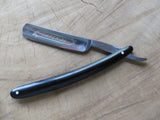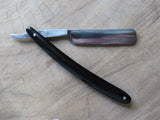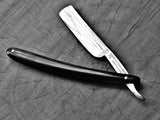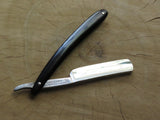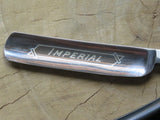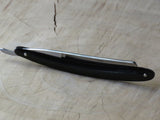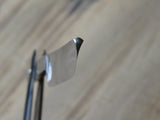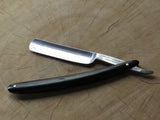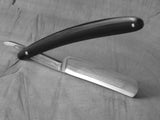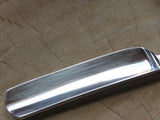There are not many of these model of razors on the net, and I have found none with a round point like this one. If I have to take a guess I'd say this razor was made sometime after WW1 to around 1950, this razor has seen very little honing action and you are not going to find many GEO's in this condition. There are very few marks on the blade and the scales and pins are in good original condition. This razor weighs 38 grams, the blade is 11/16ths, or around 17 mm high, and has a cutting edge of around 69 mm. It is original with no mods and few markings. The razor is contamination free and ready to shave. It shaves very smoothly and the full hollow grind blade sings loud and proud!
GEO Wostenholm & son is quite a well known brand of razor, and they are well known for the good quality razors they produced, to this day they remain some of the most popular vintage brands that are always in demand. The company operated from Rockingham Works 1809(1815) - 1848 and from their Washington works from 1848-1978
The original owner, George Wostenholm became a Freeman in 1826 and was granted the maker's mark - I*XL - a mark originally granted to William A. Smith at 29th June, 1787. The I*XL letters are pronounced phonetically "I excel"
He was apprenticed to his father, who brought him into the business. It was described in a directory in 1825 as ‘George Wolstenholme & Son, manufacturers of table knives, and forks, pen, pocket, and sportsman’s knives, and general dealers in cutlery, 78 Rockingham Street’.
Surviving portraits and photographs of George Wostenholm show a short, stocky man, with balding head and determined gaze. According to one observer, he was the archetypal ‘successful manufacturer, masterful, keen, energetic and far-sighted, whose whole thought and ideas – apart from realizing a fortune – seemed to be centred in achieving in his cutlery the legend of his trade mark, I*XL’ (Coward, 19192). He was not only a practical cutler, but a dynamic salesman. Some less printable adjectives were also used about him by his employees. An excitable workaholic, he had a volcanic temper which he did not hesitate to vent on subordinates. He used the ‘bounty system’ to bind men to him by advancing loans of £5 or £10 to be paid by instalments; and enforced the rule of ‘fourteen to the dozen’ knives. But if he did not spare his workers, Wostenholm did not spare himself either.
Wostenholm’s early business trips were in England, but it was in America that he found scope for his prodigious energy. Wostenholm’s pen knives were soon known to American customers (Delaware Journal, 14 December 1827). In 1830, the Wostenholms, father and son, launched a partnership with William Stenton. The latter was an experienced cutlery merchant, whose standing was recognised by the style of the firm: Stenton, Wostenholm & Son. However, in November 1831 the partnership was dissolved. The story is that George Wostenholm Jun. and Stenton fell out. In the following year, a new partnership between father and son was drawn up. In 1831, George Wostenholm was granted the trade mark he was to make famous – I*XL. This mark – originally granted to William Aldam Smith in 1787 – had been bought by George Sen. in 1826.
However, George Sen. died ‘suddenly’ on 31 December 1833, at his residence at Crookes Moor. He was buried at Howard Street Chapel, where he had been deacon. George Wostenholm then took firm control of Rockingham Works and its American business. He had apparently first visited America in 1831. He certainly made the journey in the next year. Passenger lists show him disembarking in New York from the sailing ship Sheffield on 19 April 1832. He was accompanied by Joshua Moss (qv, Wilson, Hawksworth & Moss). Wostenholm was said to have made about thirty visits to the USA – no mean achievement when crossing the Atlantic took four to five weeks (sometimes longer) and was perilous.
In 1844, a New York office was opened under Asline Ward (1821-1905) – the son of Thomas Asline Ward (qv, Broomhead & Ward). In the 1850s, Wostenholm also had agents in Philadelphia and Boston. It was reported that Wostenholm thought nothing of travelling to San Francisco to defend his name in a trade mark court case. Consequently, one newspaper said: ‘Probably no Sheffield face was so well known as his in America, and none of our people could vie more successfully than he with the business enthusiasm and push of the keenest New Yorker’ (Sheffield Independent, 19 August 1876).
For Wostenholm, America was the ideal market with its expanding frontier and enormous demand for folding knives, razors, and weapons. The firm’s trade became almost exclusively American and Wostenholm made little attempt to nurture other markets. His imagination fired by all things American, Wostenholm began thinking big. Only a few blocks away from Rockingham Street was a vacant tenement factory, known as Washington Works, which fronted Wellington Street and was bounded by Bowdon Street and Eldon Street. In 1848, Wostenholm bought it. The size of Washington Works would be greatly exaggerated in company engravings. Under Wostenholm, it retained its tenement character and, like most Sheffield factories, was unhygienic and hazardous. But Washington Works had warehouses, grinding wheels, and steam engines and economies of scale were achieved by bringing so many workers under one roof (Sheffield Independent, 12 January 1839). Other economies were achieved by Wostenholm’s hard-nosed attitude to labour and tough bargaining over wages.
Despite his autocracy, Wostenholm earned the loyalty of his workforce as American orders rolled into Washington Works. Few business records have survived from this era (apparently Wostenholm destroyed most of them before his death), but one letter in 1858 from Asline Ward to George Wostenholm captures the bullish spirit. Ward wrote: ‘The future trade with America must be immense, territories that are now half savage will gradually become desirous of better and better goods & educated to aspirations of babaric cost and splendour’ The US Markets were very lucrative for the company, but WWII gave this, like so many other companies a solid blow.
Post WWII George Wostenholm's Washington Works was poorly positioned for the improving economic picture of the 1950's and 60's; part of the factory was destroyed in the war by a German bomb. At this time pressure was also growing from far eastern manufacturers which would eventually close the doors of the century old Washington Works. Wostenholm made aquisitions in 1961 e.g. Champion owned by Christopher Johnson - to bolster the companies prowess in the market, in this case with shears. In 1971 Wostenholm was purchased by Joseph Rodgers and the new company, Rodgers-Wostenholm, moved to Guernsey Road. In 1975 this joint firm was bought by Richards, which in turn was purchased by Imperial Knife in 1977. Imperial Knife an American firm based in New York made no money on their investment and by 1983 the Richards-Rodgers-Wostenholm group was bankrupt. Washington Works and the company records had been demolished in 1978; the end of 179 years of operation.
*Vintage razors are priced according to model and availability, time spent cleaning and reconditioning and time/level of honing. Please enquire if you need additional work done to this razor prior to purchase. All straight razors will require a stropping on a leather strop before every use. Pics are unedited (detail) and provide a true image of the condition of the razor.











